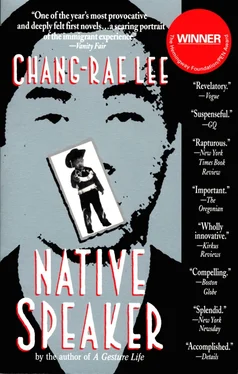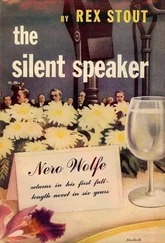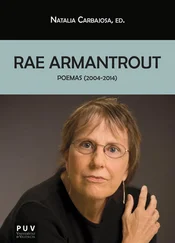* * *
My father liked to think I was a civil servant. Sometimes he asked Lelia what a municipal employee did on trips to Providence or Ann Arbor or Richmond. Size comparisons, Lelia might joke, but then she always referred him directly to me. But he never approached me, he never asked me point-blank what I did, he’d just inquire if I were earning enough for my family and then silently nod. He couldn’t care for the importance of career . That notion was too costly for a man like him.
He genuinely liked Lelia. This surprised me. He was nice to her. When we met him at one of his stores he always had a sundry basket of treats for her, trifles from his shelves, bars of dark chocolate, exotic tropical fruits, tissue-wrapped biscotti. He would show her around every time as if it were the first, introduce her to the day manager and workers, most of whom were Korean, tell them proudly in English that she was his daughter. Whenever he could, he always tried to stand right next to her, and then marvel at how tall and straight she was, like a fine young horse , he’d say in Korean, admiringly. He’d hug her and ask me to take pictures. Laugh and kid with her generously.
He never said it, but I knew he liked the fact that Lelia was white. When I first told him that we were engaged I thought he would vehemently protest, again go over the scores of reasons why I should marry one of our own (as he had rambled on in my adolescence), but he only nodded and said he respected her and wished me luck. I think he had come to view our union logically, practically, and perhaps he thought he saw through my intentions, the assumption being that Lelia and her family would help me make my way in the land.
“Maybe you not so dumb after all,” he said to me after the wedding ceremony.
Lelia, an old-man lover if there was one, always said he was sweet.
Sweet.
“He’s just a more brutal version of you,” she told me that last week we were taking care of him.
I didn’t argue with her. My father was obviously not modern, in the psychological sense. He was still mostly unencumbered by those needling questions of existence and self-consciousness. Irony was always lost on him. He was the definition of a thick skin. For most of my youth I wasn’t sure that he had the capacity to love. He showed great respect to my mother to the day she died — I was ten — and practiced for her the deepest sense of duty and honor, but I never witnessed from him a devotion I could call love. He never kissed her hand or bent down before her. He never said the word, in any language. Maybe none of this matters. But then I don’t think he ever wept for her, either, even at the last moment of her life. He came out of the hospital room from which he had barred me and said that she had passed and I should go in and look at her one last time. I don’t now remember what I saw in her room, maybe I never actually looked at her, though I can still see so clearly the image of my father standing there in the hall when I came back out, his hands clasped at his groin in a military pose, his neck taut and thick, working, trying hard to swallow the nothing balling up in his throat.
His life didn’t seem to change. He seemed instantly recovered. The only noticeable thing was that he would come home much earlier than usual, maybe four in the afternoon instead of the usual eight or nine. He said he didn’t want me coming home from school to an empty house, though he didn’t actually spend any more time with me. He just went down to his workshop in the basement or to the garage to work on his car. For dinner we went either to a Chinese place or the Indian one in the next town, and sometimes he drove to the city so we could eat Korean. He settled us into a routine this way, a schedule. I thought all he wanted was to have nothing unusual sully his days, that what he disliked or feared most was uncertainty.
I wondered, too, whether he was suffering inside, whether he sometimes cried, as I did, for reasons unknown. I remember how I sat with him in those restaurants, both of us eating without savor, unjoyous, and my wanting to show him that I could be as steely as he, my chin as rigid and unquivering as any of his displays, that I would tolerate no mysteries either, no shadowy wounds or scars of the heart.
I thought it would be the two of us, like that, forever.
But one day my father called from one of his vegetable stores in the Bronx and said he was going to JFK and would be late coming home. I didn’t think much of it. He often went to the airport, to the international terminal, to pick up a friend or a parcel from Korea. After my mother’s death he had a steady flow of old friends visiting us, hardly any relatives, and it was my responsibility to make up the bed in the guest room and prepare a tray of sliced fruit and corn tea or liquor for their arrival.
My mother had always done this for guests; although I was a boy, I was the only child and there was no one else to peel the oranges and apples and set out nuts and spicy crackers and glasses of beer or a bottle of Johnnie Walker for my father and his friends. They used to sit on the carpeted floor around the lacquered Korean table with their legs crossed and laugh deeply and utterly together as if they had been holding themselves in for a long time, and I’d greedily pick at the snacks from the perch of my father’s sturdy lap, pinching my throat in just such a way that I might rumble and shake, too. My mother would smile and talk to them, but she sat on a chair just outside the circle of men and politely covered her mouth whenever one of them made her laugh or offered compliments on her still-fresh beauty and youth.
The night my father phoned I went to the cabinet where he kept the whiskey and nuts and took out a bottle for their arrival. An ashtray, of course, because the men always smoked. The men — it was always only men — were mostly friends of his from college now come to the States on matters of business. Import-export. They seemed exotic to me then. They wore shiny, textured gray-blue suits and wide ties and sported long sideburns and slightly too large brown-tinted polarizing glasses. It was 1971. They dragged into the house huge square plastic suitcases on wheels, stuffed full of samples of their wares, knock-off perfumes and colognes, gaudy women’s handkerchiefs, plastic AM radios cast in the shapes of footballs and automobiles, leatherette handbags, purses, belts, tinny watches and cuff links, half-crushed boxes of Oriental rice crackers and leathery sheets of dried squid, and bags upon bags of sickly-sweet sucking candy whose transparent wrappers were edible and dissolved on the tongue.
In the foyer these men had to struggle to pull off the tight black shoes from their swollen feet, and the sour, ammoniac smell of sweat-sopped wool and cheap leather reached me where I stood overlooking them from the raised living room of our split-level house, that nose-stinging smell of sixteen hours of sleepless cramped flight from Seoul to Anchorage to New York shot so full of their ranks, hopeful of good commerce here in America.
My father opened the door at ten o’clock, hauling into the house two huge, battered suitcases. I had just set out a tray of fruits and rice cakes to go along with the liquor on the low table in the living room and went down to help him. He waved me off and nodded toward the driveway.
“Go help,” he said, immediately bearing the suitcases upstairs.
I walked outside. A dim figure of a woman stood unmoving in the darkness next to my father’s Chevrolet. It was late winter, still cold and miserable, and she was bundled up in a long woolen coat that nearly reached the ground. Beside her were two small bags and a cardboard box messily bound with twine. When I got closer to her she lifted both bags and so I picked up the box; it was very heavy, full of glass jars and tins of pickled vegetables and meats. I realized she had transported homemade food thousands of miles, all the way from Korea, and the stench of overripe kimchee shot up through the cardboard flaps and I nearly dropped the whole thing.
Читать дальше












